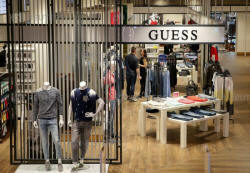|
The investigation into Guess began in June 2017 following a
year-long inquiry into the cross-border online sales practices
of 1,900 companies.
The European Commission said Guess' distribution deals with
retailers restricted them from using the Guess brand names and
trademarks for online search advertising and also prevented them
from setting the retail price independently.
Retailers were also required to get authorization from Guess
before they were allowed to sell online, while the criteria for
such approval was not based on any specified quality criteria.
Sellers were also not allowed to sell to consumers outside their
authorized areas.
This system allowed Guess to partition off certain European
markets, resulting in retail prices 5 to 10 percent higher in
central and eastern Europe than in western Europe, the
Commission said. The illegal practices occurred up to Oct. 31
last year.
The EU competition enforcer said the retailer cooperated by
providing key evidence and received a 50 percent cut in the
fine.
Guess had already estimated the EU fine at 37 to 40.6 million
euros in a regulatory filing last month, saying that it had
already made certain changes to business practices and
agreements in response to the EU investigation.
(Reporting by Foo Yun Chee. Editing by Jane Merriman)
[© 2018 Thomson Reuters. All rights
reserved.] Copyright 2018 Reuters. All rights reserved. This material may not be published,
broadcast, rewritten or redistributed.
Thompson Reuters is solely responsible for this content.
 |




